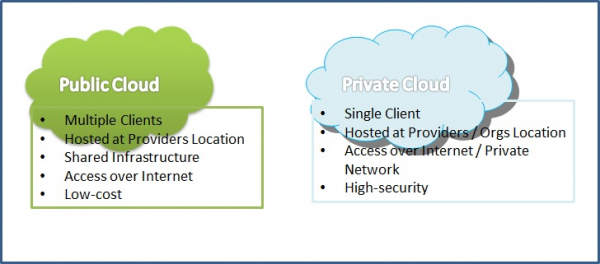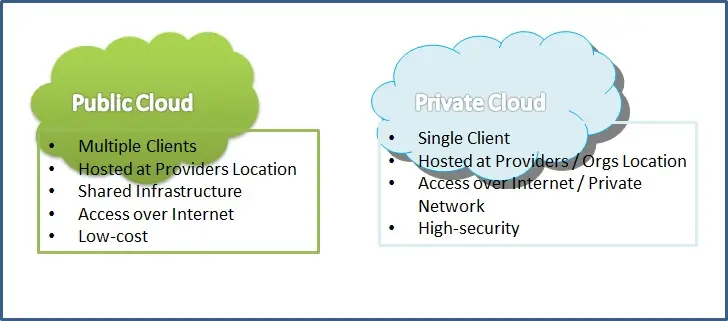Public Cloud vs Private Cloud difference
A public cloud is basically a service offered by a third party. It can host storage for different companies at the same time and on the same server. It can be used by programmers of different companies to build and execute their code at the same time, without interfering with each other’s activities. In a nutshell, the public cloud is open to all subscribers and can be accessed by different customers at the same time. The same server can be catering to different customers and can be housing data of different customers. In the case of private clouds, there are dedicated servers. These servers contain data from a single organization. It offers a platform for working with people of the organization for which, it was built. In a public cloud environment, it is paid as you go situation. Clients pay for only the portion and services of the cloud which they are using. They need not worry about other, inaccessible portions of the public cloud as they are not related to them or their organization. In a private cloud, the admins have to take care of the entire cloud. They should see to it that the setup is indeed meeting the requirements essential for it to be termed cloud. Thus, costs are higher in the private cloud model as the company has to buy all the servers required and pay the staff handling the cloud.
Public or Private Cloud – Which is better?
Though most would argue it is based on your budget, I would say the budget has to be allotted based on the type of business you are doing. Of course, if your budget is not big and you cannot afford a premise cloud to store all of your data, you can have a semi-private cloud, that is, the hybrid cloud. But it essentially depends on what you wish to do. Data can be categorized into different categories. Different businesses have different types of data that can be categorized as being very sensitive to less sensitive. If your business deals with data of very sensitive type – for example, the clients’ credit card information, etc., you have to have a local cloud irrespective of the budget as public clouds are more prone to hack attempts as compared to private clouds. That said, data of such organizations can also be stored part on local servers and part on public cloud. The less sensitive part of the data goes to the public cloud to save on server and maintenance costs while the most sensitive part goes to the local cloud. Such a setup is normally called a hybrid cloud – given that the company uses algorithms that link the public cloud to the private cloud and vice versa – of course, with ample precautions to make the data secure using methods like two-step authentication and encryption, etc. Talking of encryption, most public clouds do not provide a good encryption system. Data may be encrypted once it reaches the server but the path from organization computers to the public cloud may not be encrypted. Further, the encryption methods on public clouds are not pretty good as evident from different articles I read on the topic. In such cases too, a private or a hybrid cloud is the best option. On the other hand, if you are willing to risk somewhat and the data is not pretty sensitive, you can encrypt the data using one of the many techniques (or encryption software available) before transferring it to the cloud. Budget is also a constraint but as I said earlier, the sensitivity of data should aid you in deciding whether to go for public or private cloud. Hybrids are the best of both worlds as you can pay less for less sensitive data and use dedicated servers (private cloud) for sensitive data. The type of business with the cloud is also a factor in determining what type of cloud to choose. If you need a platform to create and test apps, there are several clouds offering such functionality. Likewise, if you need infrastructure for your business and do not wish to invest much into it, you can go for Infrastructure as a Service type clouds. If your business has nothing much to store and is more inclined towards general operations, you might opt for a public cloud as it will save a lot in the long run. Dedicated cloud, on the other hand, will be difficult to set up as well as proving to be costly at the same time. A little thought has to go into the cloud strategy you will develop and it should incorporate the following: I am sure that in many cases, the answers would zero in to having a small but dedicated on-premise cloud as well as using public cloud for the majority of operations. That is, in most cases, the answer could be the usage of both public and private cloud which is called a hybrid cloud. However, this again depends solely on the nature of your business as the budget has to be arranged as per the requirements. Which one of these would you like to read next?

